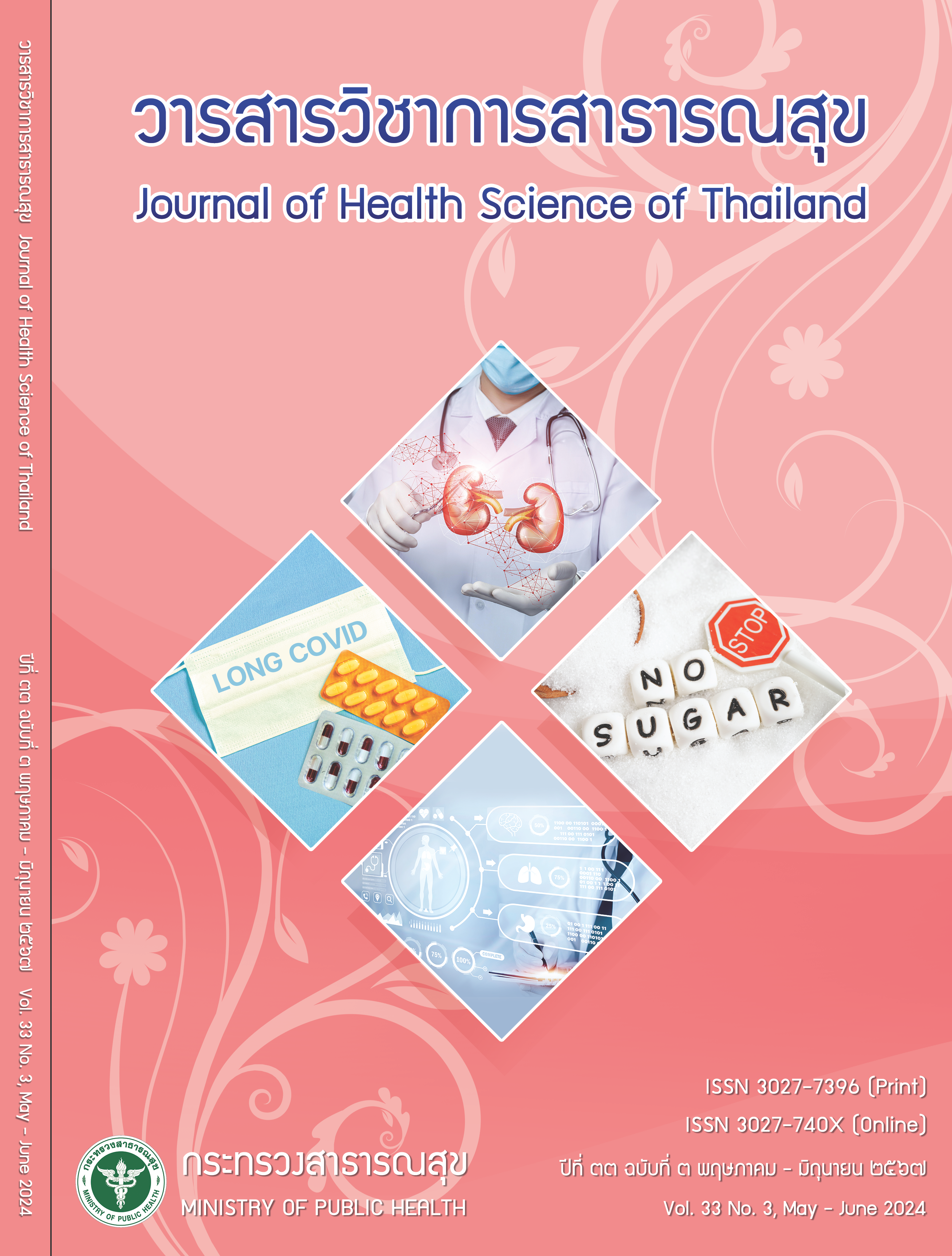Effectiveness of a Health Promotion Program on Reducing Sugar-Sweetened Beverage Consumption among Health Village Volunteers in Tak Province
Keywords:
consumption, sugar-sweetened beverage, health village volunteers, theory of planned behaviorAbstract
This study was a quasi-experimental research with the objective to assess the effectiveness of a health promotion program on reducing sugar-sweetened beverage consumption among health village volunteers in Tak province. The samples consisted of 70 health village volunteers in Tak province selected through purposively sampling method; and were divided into 35 individual in the experiment group and 35 in the controlled group. The experiment group was provided with a health promotion program on reducing sugar-sweetened beverage consumption based on the Theory of Planned Behavior while the control group provided with regular health promotion services. Data were collected using six questionnaires, with content validity assessed using the index of congruence (IOC) ranging between 0.67 and 1.00. The reliability of the questionnaires was measured by Cronbach’s alpha coefficient of which the outcome for attitudes towards reducing sugar-sweetened beverage consumption, subjective norms, perceived behavioral control, intentions, and behavior of sugar-sweetened beverage consumption was 0.80, 0.79, 0.85, 0.86, and 0.88 respectively. Descriptive statistics including percentages, means, and standard deviations were used for data analysis. The effectiveness program of the between groups was tested using independent t-test and those within group was tested using paired t-test statistics. The study revealed that after the program ended, mean scores of attitudes towards reducing sugar-sweetened beverage consumption, subjective norm, perceive behavioral control and intention to reduce sugar-sweetened beverages consumption were greater than before intervention and the control group. After the intervention, mean score of the behavior of sugar-sweetened beverage consumption and body mass index (BMI) in the experimental group was significantly less than mean scores before the program and those of the control group (p<0.05). Consequently, the health promotion program effectively encouraged village health volunteers to reduce their consumption of sugar-sweetened beverages. Therefore, thsi approach should be widely implemented to reduce the consumption of sugar-sweetened beverages among health village volunteers, aiming to prevent non-communicable diseases (NCDs) and serve as a model for healthy behaviors at community level.
Downloads
References
World Health Organization. Noncommunicable diseases 2023 [Internet]. [cited 2023 Dec 20]. Available from: https://www.who.int/news-room/fact-sheets/detail/ noncommunicable-diseases
World Health Organization. Guideline sugars intake for adults and children. Geneva: World Health Organization; 2015.
Singh GM, Micha R, Khatibzadeh S, Shi P, Lim S, Andrews KG, et al. Global, regional, and national consumption of sugar-sweetened beverages, fruit juices, and milk: a systematic assessment of beverage intake in 187 countries. PLoS ONE 2015;10(8):e0124845.
Bleich SN, Vercammen KA, Koma JW, Li Z. Trends in beverage consumption among children and adults, 2003- 2014. Obesity 2018;26(2):432-41.
Wang M, Yu M, Fang L, Hu RY. Association between sugar-sweetened beverages and type 2 diabetes: a meta-analysis. J Diabetes Investig 2015;6(3):360-6.
de Boer EC, de Rooij SR, Olthof MR, Vrijkotte TGM. Sugar-sweetened beverages intake is associated with blood pressure and sympathetic nervous system activation in children. Clin Nutr ESPEN 2018;28:232-5.
Yuzbashian E, Asghar G, Mirmiran P, Zadeh-Vakili A, Azizi F. Sugar-sweetened beverage consumption and risk of incident chronic kidney disease: Tehran lipid and glucose study. Nephrology (Carlton) 2016;21(7):608- 16.
Ma J, Fox CS, Jacques PF, Speliotes EK, Hoffmann U, Smith CE. et al. Sugar-sweetened beverage, diet soda, and fatty liver disease in the Framingham Heart Study cohorts. J Hepatol 2015;63(2):462-9.
Fung TT, Malik V, Rexrode KM, Manson JE, Willett WC, Hu FB. Sweetened beverage consumption and risk of coronary heart disease in women. Am J Clin Nutr 2009;89(4):1037-42.
ขนิษฐ์ รัตรรังสิมา. สถานการณ์การบริโภคน้ำตาลของ ประชากรไทย ปี 2540 - 2553. วิทยาสารทันตสาธารณสุข 2555;17:23-30.
ศูนย์สื่อสารสาธารณะ กรมอนามัย. กรมอนามัยเผยชานมไข่มุกพลังงานสูง ชี้ดูด 1 แก้วรับพลังงานสูงถึง 360 กิโลแคลอรี แนะเลี่ยง ดีต่อสุขภาพ 2562 [อินเทอร์เน็ต]. [สืบค้นเมื่อ 10 ต.ค. 2566]. แหล่งข้อมูล: https://multimedia.anamai.moph.go.th/news/news260862-2/
Pan A, Hu FB. Effects of carbohydrates on satiety: Differences between liquid and solid food. Obesite 2011;6(4):206-11.
Hongsanun W, Kitreerawutiwong N, Petcharaburanin K. Sugar content in sugar-sweetened beverages in the aftermath of Thailand’s sugar tax: a cross-sectional analysis. J Med Assoc Thai 2021;104(4):1-8.
สุลัดดา พงษ์อุทธา, ปิติภา จงวัฒน์ผล, ชัชวาลย์ เผ่าเพ็ง, ภาวิน ตันตยาภิรักษ์. ผลกระทบจากการขึ้นราคาต่อพฤติกรรม การบริโภคเครื่องดื่มรสหวาน: การคาดการณ์ของผู้บริโภค. นนทบุรี: มูลนิธิเพื่อการพัฒนานโยบายสุขภาพระหว่าง ประเทศ; 2561.
ศูนย์อนามัยที 2 พิษณุโลก. H4U วัยทำงาน เขตสุขภาพที่ 2 2566 [อินเทอร์เน็ต]. [สืบค้นเมื่อ 15 ธ.ค. 2566]. แหล่ง ข้อมูล: https://hpc2service.anamai.moph.go.th/workingdata/h4u.php
สำนักงานสาธารณสุขจังหวัดตาก. กลุ่มรายงานมาตรฐาน 2566 [อินเทอร์เน็ต]. [สืบค้นเมื่อ 15 ธ.ค. 2566]. แหล่ง ข้อมูล: https://tak.hdc.moph.go.th/hdc/main/index.php
กระทรวงสาธารณสุข. ระเบียบกระทรวงสาธารณสุขว่าด้วย อาสาสมัครสาธารณสุขประจำหมู่บ้าน พ.ศ. 2554. นนทบุรี: กระทรวงสาธารณสุข; 2554.
กองสนับสนุนสุขภาพภาคประชาชน. อสม. 2566 [อินเทอร์- เน็ต]. [สืบค้นเมื่อ 15 ธ.ค. 2566]. แหล่งข้อมูล: https:// www.thaiphc.net/new2020/content/1
Ajzen I. The theory of planned behavior. Organizational Behavior & Human Decision Processes 1991;50(2): 179-211.
Zoellner J, Chen Y, Davy B, You W, Hedrick V, Corsi T, et al. Talking health, a pragmatic randomized-controlled health literacy trial targeting sugar-sweetened beverage consumption among adults: Rationale, design & methods. Contemp Clin Trials 2014;37(1):43-57.
Bernard, R. Fundamentals of biostatistics. 5th ed. Duxbery: Thomson learning; 2000.
พรรณี ปิติสุทธิธรรม, ชยันต์ พิเชียรสุนทร. ตาราการวิจัยทางคลินิก (textbook of clinical research). กรุงเทพมหานคร: อมรินทร์พริ้นติ้งแอนด์พับลิชชิ่ง; 2556.
จุฬาลักษณ์ โกมลตรี. บทความพิเศษ:การคำนวณขนาด ตัวอย่าง. วารสารสุขภาพจิตแห่งประเทศไทย 2555;20(3): 192-8.
วิลาสินี หงสนันทน์. การพัฒนาแบบสอบถามการบริโภค เครื่องดื่มรสหวานที่มีน้ำตาลของวัยรุ่นไทย [วิทยานิพนธ์ สาธารณสุขศาสตรดุษฎีบัณฑิต]. พิษณุโลก: มหาวิทยาลัย นเรศวร; 2563. 252 หน้า.
Cronbach L J. Essentials of psychology and education. New York: McGraw-Hill; 1984.
ปราโมทย์ วงศ์สวัสดิ์ . แบบแผนการวิจัยเชิงทดลอง:การ ประยุกต์ใช้ในงานวิจัยเพื่อพัฒนาพฤติกรรมสุขภาพ. พิษณุโลก: มหาวิทยาลัยนเรศวร; 2561.
วิลาสินี หงสนันทน์ , นิทรา กิจธีระวุฒิวงษ์. การประยุกต์ใช้ ทฤษฎีพฤติกรรมตามแผนกับความตั้งใจในการลดการบริโภคเครื่องดื่มรสหวานที่มีน้ำตาลในวัยรุ่น. วารสาร วิทยาลัยพยาบาลพระปกเกล้า 2563;31(2):240-56.
Calabro R, Kemps E, Prichard I. Socio-cognitive determinants of sugar-sweetened beverage consumption among young people: a systematic review and meta-analysis. Appetite 2023;180:106334.
ธีร์ปนกรณ์ ศุภกิจโยธิน. โปรแกรมการปรับเปลี่ยนพฤติกรรม การบริโภคเครื่องดื่มรสหวานที่มีน้ำตาลของวัยรุ่นไทยโดยใช้ ทฤษฎีพฤติกรรมตามแผน. วารสารศาสตร์สุขภาพและการ ศึกษา 2563;3(3):87-101.
Downloads
Published
How to Cite
Issue
Section
License
Copyright (c) 2024 Ministry of Public Health

This work is licensed under a Creative Commons Attribution-NonCommercial-NoDerivatives 4.0 International License.







